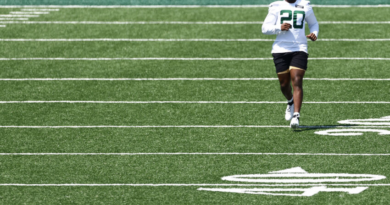Ball don’t lie: The 3 worst calls from NFL refs during Super Bowl 57

Aug 27, 2022; Baltimore, Maryland, USA; Referee Carl Cheffers (51) during the first half of the game between the Baltimore Ravens and the Washington Commanders at M&T Bank Stadium. NFL refs Mandatory Credit: Tommy Gilligan-USA TODAY Sports
While Roger Goodell appears to have some faith in NFL refs, that faith reared its ugly head in Super Bowl 57.
Carl Cheffers crew got the call for the big game between the Kansas City Chiefs and Philadelphia Eagles on Sunday night. Kansas City fans didn’t have anything kind to say to Cheffers prior to this game, and that likely won’t change after the Super Bowl.
Roger Goodell, however, was confident in his crew.
“Our officials are held to an incredibly high standard and I think they meet it. Will we try to get better? You betcha,” Goodell said just a few days ago.
Sure, we can all ‘be better’, but the number of bad calls are more noticeable now than ever before. With an increased audience via streaming and social media, nothing goes by the wayside. Officials in every sport are literally graded after every performance. Wearing the black and white is not as prestigious of a job as it used to be.
Unfortunately, the Super Bowl wasn’t a clean game, either. Much laundry was spilled on the field — and not just because of the grass. Some of it was unnecessary, while other plays contained missed calls.
I’m here to break it all down.
Super Bowl worst calls from NFL refs: What is pass interference?
James Bradberry got away with a pretty blatant pass interference call against JuJu Smith-Schuster which stalled a Kansas City Chiefs drive early in the game. It wasn’t a game-changing call, by any means, but there’s a reason it’s only the first bad decision listed.
Bradberry had his hands all over Smith-Schuster, and it appeared to be a relatively textbook.
As FanSided’s Cody Williams pointed out, it didn’t help that Cheffers was at the helm:
“It doesn’t help that referee Carl Cheffers was on the officiating crew for Super Bowl 57, a ref that many fans in Kansas City will tell you has been none too kind to the Chiefs. In fact, they might tell you this isn’t the first time that he’s screwed them over with a call.”
The league definition of pass interference is relatively simple, and leave open plenty of room for interpretation. It gives league officials a lot of leeway when making said call, which usually favors the offense:
“It is pass interference by either team when any act by a player more than one yard beyond the line of scrimmage significantly hinders an eligible player’s opportunity to catch the ball. Pass interference can only occur when a forward pass is thrown from behind the line of scrimmage, regardless of whether the pass is legal or illegal, or whether it crosses the line.”
Surely, if we apply that definition to the aforementioned play, Bradberry was guilty of PI.
Yet, later in the game the officials evened things out at the worst possible time. Bradberry was called for pass interference in the fourth quarter, which gave the Chiefs a free first down. At the time, it looked like relatively weak contact. It allowed Kansas City the chance to wind the clock down for a game-winning field goal.
Yikes. Yeah, situational awareness is not a strength of any officiating crew. It changed the entire complexion of the game, and sent Eagles fans to the streets for the wrong reasons.




